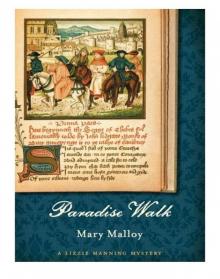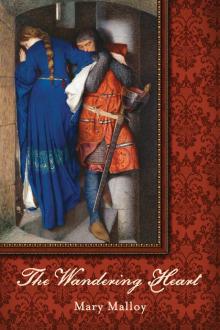- Home
- Mary Malloy
The Wonder Chamber
The Wonder Chamber Read online
The Wonder Chamber
Also by the Author
Fiction
Lizzie Manning mysteries:
The Wandering Heart
Paradise Walk
Nonfiction
Devil on the Deep Blue Sea: The Notorious Career of Captain Samuel Hill of Boston
Souvenirs of the Fur Trade:
Northwest Coast Indian Art and Artifacts Collected by American Mariners
“Boston Men” on the Northwest Coast:
The American Maritime Fur Trade, 1788-1844
A Most Remarkable Enterprise:
Lectures on the Northwest Coast Trade and Northwest Coast
Indian Life by Captain William Sturgis
The Wonder Chamber
Mary Malloy
A Lizzie Manning Mystery
Leapfrog Press
Fredonia, New York
The Wonder Chamber © 2014 by Mary Malloy
All rights reserved under International and Pan-American
Copyright Conventions
No part of this book may be reproduced, stored in a data base
or other retrieval system, or transmitted in any form, by any means, including mechanical, electronic, photocopy, recording or otherwise, without the prior written permission of the publisher.
Published in 2014 in the United States by
Leapfrog Press LLC
PO Box 505
Fredonia, NY 14063
www.leapfrogpress.com
Distributed in the United States by
Consortium Book Sales and Distribution
St. Paul, Minnesota 55114
www.cbsd.com
First Edition
E-ISBN 978-1-935248-43-9
Library of Congress Cataloging-in-Publication Data
Available from the Library of Congress
This book is dedicated to the memories of three people I loved who died while I was writing it.
My aunt, Gladys Paxton
My uncle, William Newman
My cousin, Dale Gonsalves
Enthusiastic readers and lovers of history all, they are much missed.
Contents
Prologue
Chapter 1
Chapter 2
Chapter 3
Chapter 4
Chapter 5
Chapter 6
Chapter 7
Chapter 8
Chapter 9
Chapter 10
Chapter 11
Chapter 12
Chapter 13
Chapter 14
Chapter 15
Chapter 16
Chapter 17
Chapter 18
Chapter 19
Chapter 20
Chapter 21
Chapter 22
Chapter 23
Chapter 24
Chapter 25
Chapter 26
Chapter 27
Chapter 28
Chapter 29
Chapter 30
Chapter 31
Chapter 32
Chapter 33
An interview with the author
The Author
Prologue
The corpse had been packed in salt for forty days, following the ancient prescription, and dehydration was complete. One of the men cried when he first saw her face. The gums were drawn back from her teeth, the jaw wide open, and the eyelids bulging, where his assistant had removed her eyes and stuffed the empty sockets with linen soaked in resin. He had not been able to look when that part of the process was done, or when the bits of what had been her brain were pulled with a long hook through one of her nostrils.
It had been his job to remove her organs, however, and that he had done with loving care, pulling her stomach, liver, lungs and intestines carefully through the incision he made in her side, washing them all carefully and packing them in salt. Her heart had been left in her chest, as it was the seat not only of love and other emotions, but also of intelligence—all thoughts both good and awful.
His assistant had been angry through the whole process, both when they made the original preparations for mummification and now, as they washed the salt off the body.
“She was evil,” he said. “She doesn’t deserve this attention.”
There was no use arguing, she had done things with terrible consequences. But that did not mean that they could simply dispose of her like a common person. She had to be carefully prepared to lie in the sarcophagus that was waiting to receive her. And so they rubbed the body with scented oils and began the long process of wrapping her tightly in strips of linen.
Chapter 1
The headline on the society page of the New York Times spoke volumes: “Boston Heiress to Marry Italian Prince.” Whatever else one wanted to know could be seen in the grainy black-and-white picture of the unhappy couple. She was a frightened teenager with a rich father; he was a middle-aged man with an impressive title and a grim expression. The story was by now thoroughly familiar to Lizzie and she quickly scanned the description of Paddy Kelliher’s rise from poor Irish immigrant to American textile tycoon. He had used his new money to buy himself respectability, first by founding St. Patrick’s College in Charlestown, Massachusetts, and then by marrying his daughter to a European nobleman. Every article about him in his lifetime, including this one—which really ought to have been about his only daughter—told the story of his rise to riches.
Lizzie Manning looked up from her computer and through the library window to the campus green, where the grass that gave it its name now lay under a thick layer of snow. There was a larger-than-life statue of Kelliher there, which students dressed for every season and special occasion. Today it wore a bright red puffy jacket, a woolen hat with earflaps and a pompom, and a yards-long muffler in the school colors of green and white.
“Poor Maggie Kelliher,” Lizzie said, turning to her friend Jackie Harrigan, who sat at her desk at one end of the reading room.
“You mean the Principessa Della Gonzaga?” Jackie asked, impressively giving the title a rhythmic Italian cadence. “She might have been the unfortunate victim of a couple of grasping men, but she left you a fortunate legacy. I can’t believe the college is paying for you to have a vacation in Italy.”
“Please,” Lizzie answered sternly, “it is not a vacation. How many times do I have to tell you that my trip to Bologna—with its fabulous food and great collections—will be hard, hard work.”
Jackie laughed. “Oh yes! I’m glad you reminded me how hard you will be working so that I can think of you with real sympathy while I shovel snow and layer on the sweaters.”
“It’s not all that warm in northern Italy, you know. I’ll be wearing a sweater,” Lizzie responded, and then corrected herself. “Well maybe I will wear a sweater. But of course I won’t be shoveling snow. They have servants for that kind of thing at the Palazzo.” She mimicked her friend’s Italian accent as she said the last word.
Jackie had spent a semester in Rome during college and now gave a rapid soliloquy in Italian, from which Lizzie captured only two words, and they were not ones introduced on the Rosetta Stone computer program she was using each day to prepare her for the project.
“Luckily for you my friend,” she said, turning back to her work, “Italian sounds quite lovely even when you are saying ugly things.”
“There was nothing ugly about it,” Jackie said. “Only my best wishes for your work, and curiosity why they didn’t give this project to me, who actually spea
ks the language.”
Lizzie kept her back to her friend and smiled, watching through the window as a snowball flew across the green and smacked Paddy Kelliher’s statue in the side of the head.
“I don’t need to speak the language,” she said. “As I will have my own personal full-time translator always at the ready. And besides, one has to know about ancient collections for this particular project.”
There was a grumbling sound from Jackie’s end of the room that was neither Italian nor English and Lizzie smiled again.
The two friends took up the conversation again at lunch, where they were joined by their colleague, Kate Wentworth, and their friend Rose Geminiani, who owned the restaurant where they ate every Thursday. Jackie immediately repeated her complaint that she spoke Italian and ought to make the trip.
“If that’s the criteria,” Rose interrupted, “then I should be the one to go. I speak better Italian than you, and my father is from Bologna, so I even have the right accent—you speak Roman.” She nudged Jackie’s arm with her elbow as she spoke, and put a plate in front of her.
“I’d love to bring you all,” Lizzie said, “but the college will only be paying for me.”
“How long will you be gone?” Kate asked.
Lizzie explained that she would be in Italy for about three weeks, selecting objects from the Gonzaga collection to bring back to Boston for an exhibition at St. Patrick’s College the following September, as part of the college’s centennial celebration.
“Explain to me again, this relationship between the Gonzagas and St. Pat’s,” Rose said, sitting down for the first time since her friends had arrived.
“Don’t you know the famous story of our founder, Paddy-boy Kelliher, marrying his daughter off to the Italian prince?” Jackie answered.
“Famous to whom?” Rose asked, pouring wine into each of their glasses.
“Well, it’s famous at St. Pat’s, of course,” Kate offered, “and Lizzie wrote a book about it.”
Rose turned to Lizzie. “You wrote a book about a local girl marrying an Italian prince and you never gave me a copy?”
Lizzie took the glass and slowly twirled it to move the wine around the circle of the goblet. She shrugged. “That was only a tiny part of the book, I assure you. It’s really about the guy whose money built the campus at St. Pat’s, and it came out in a very small edition.” She raised the glass. “Let’s drink to Maggie Kelliher,” she said.
“The Principessa Della Gonzaga,” Jackie added.
“Oh, I’ll drink to that!” Rose said with enthusiasm, touching the rim of her glass to those of each of her friends with a satisfying clink. She asked Lizzie why she hadn’t spent more time on the daughter than the father in her book. “She sounds much more interesting.”
“She may have been,” Lizzie said, “but I don’t think her story was the happy fairy tale romance of the prince and the commoner that you seem to be seeking in your question. And besides,” she added, “I was instructed by the college to write a history of our founder.”
Jackie interjected that most colleges had something to be embarrassed about in the sources of wealth that underpinned their founding.
“If it wasn’t slave traders, it was industrial magnates with a history of exploiting their workers. Lately it has become popular to pick at those old scabs in public, and our college president isn’t the only one to assign to a professor the task of dragging that dark history into the light so that it can be confronted.”
“And there was a lot to confront with old Paddy-boy,” Lizzie said. “He made his money making buttons and woolens for both sides in the Civil War.”
“Did he make a lot at that?” Rose asked.
“More than a million bucks!” Lizzie said, “and all by the time he was twenty-five years old.”
Kate defended their long-dead patron. “There is something very impressive in leaving Ireland with nothing at the age of seventeen and making a million dollars before he had even been in America for ten years. I’d say he was the manifestation of the immigrant dream.”
Lizzie agreed. “Certainly part of his success was in the timing of his arrival and his having made investments in what we would now call start-up companies just before the war began.”
“But you can’t deny he had a canny eye for making money,” Kate pressed.
“No, I certainly don’t deny that.”
“Do you condemn him for having supplied both sides in the war?” Rose asked.
“We just condemn him on principle for being a rich guy,” Jackie interjected, pouring herself another glass of wine. “And for making his daughter marry a rich foreigner.”
“Well that’s hardly fair,” Rose said insistently. “He was a rich foreigner by then—and an Italian prince, I mean, come on, that’s no ordinary rich foreigner!”
“And he probably wasn’t rich,” Jackie said, correcting herself. “He probably needed the Kelliher money to keep up his palazzo.”
Lizzie looked at her watch. She had a meeting about the exhibit with Father Lawrence O’Toole, the president of the college, at 2:00 and needed to walk back across the bridge to Charlestown before then.
“Here’s what I know of Patrick Malachi Kelliher,” she said definitively. “He gave a lot of jobs to Irish immigrants which can be interpreted as either exploiting them or setting them up for success in the New World; he did supply materials for uniforms to both sides in the Civil War, which he justified as not being guns and therefore making him not responsible for any deaths; and he founded the college where three of us work, and I’m happy for that.” She drained her wineglass and stood up. “And his daughter married into a family that had one of the great collections from the Renaissance. And I can’t wait to get my hands on it!”
Chapter 2
Despite the fact that Lizzie considered Rose Geminiani a good friend and had known her for more than a decade, the history of their relationship could be written on a napkin. Almost every meeting had taken place during lunches at Rose’s restaurant. Only once, at a Christmas party several years earlier, had Rose been in Lizzie’s house. It was consequently a surprise when Rose called Lizzie at home on the Sunday morning following their conversation about Paddy Kelliher, his daughter and the prince.
“My father knew Maggie Kelliher—the Princess Gonzaga!” Rose said enthusiastically after they had exchanged greetings. “She paid for him to go to St. Pat’s, and her marriage was a love story, just like I hoped.”
She slowed down for a moment to explain that it really might have been love at first sight—or at least love at very near to when they first met—then sped up again and chattered on about her father’s childhood memories of the old woman. “Apparently she taught many of the local kids in Bologna to speak English, sent several dozen of them to Boston to go to college, and was a leader of revolutionary activity in the Second World War.” She finished by saying that Lizzie should write a book about her.
Lizzie thought about this for a moment. “Well I am writing a catalog for the exhibit—it would make sense to work her into the story as the link between the college and the Gonzaga collection.”
“My pop wants to talk to you about her.”
“I’d love to meet him.”
“He wants you to come for dinner tonight. Can you and Martin do that?”
“Aren’t you working?”
“This is a slow time of year. I think I can absent myself from the restaurant for one Sunday dinner, and this conversation sounds too good to miss.” From the cadence in Rose’s voice Lizzie could almost see the gestures of excitement she was making with her hands on the other end of the line.
“We’re going to have dinner with Rose Geminiani’s father tonight,” Lizzie said to her husband as she hung up the phone. “I hope you don’t have other plans.”
Martin said that he didn’t. “And I’ll be glad to see Tony,” he
added.
Lizzie looked surprised. “You know him?”
“Tony Tessitore,” he said. “I’ve met him several times at Rose’s restaurant.”
“You’re kidding me,” she answered. “I’ve never met him and I go there almost every week for lunch.”
“Well I go there several times a week for coffee in the afternoon and that’s when the old man hangs around.”
“This is part of your secret life, about which you never told me?”
He smiled at her. “I’ll drive. I dropped the old guy off at his house once and I even know where he lives.”
Boston’s North End neighborhood had not changed much in the fifty years that Tony Tessitore had lived there. His row house on North Bennet Street was built early in the nineteenth century; he had moved into the first-floor apartment when he graduated from St. Pat’s College, and eventually bought the whole building. There was a small brass plaque above the bell that said “Vito Antonio Tessitore,” and Lizzie silently rolled the name over her tongue before she rang.
The door opened almost immediately and Lizzie saw an old man, shorter than herself, with a neatly trimmed beard and eyes that looked like Santa’s, as described in the poem about the night before Christmas. He seemed genuinely enthusiastic to see them, as if he hadn’t had visitors in years, though that was quickly shown not to be the case as he described how busy he had been in the last several days.
“Martin,” he said, holding out his hand, “wonderful to see you again, and this must be Lizzie, welcome.”
Rose stood behind him, waving at Lizzie over her father’s shoulder.
“Pop has made you a special Bolognese spread,” she said, pointing to a tray of meats, cheeses, olives and bread, “in honor of the Princess Gonzaga.”

 Paradise Walk
Paradise Walk The Wandering Heart
The Wandering Heart The Wonder Chamber
The Wonder Chamber